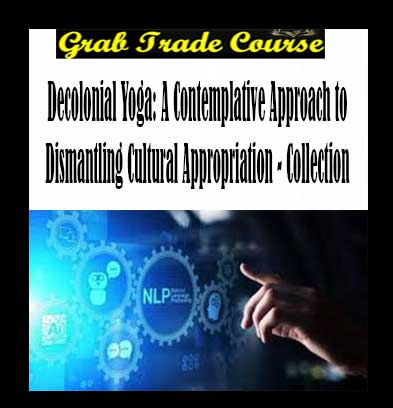Neil Dalal – Decolonial Yoga: A Contemplative Approach to Dismantling Cultural Appropriation – Collection
Description
Neil Dalal – Decolonial Yoga: A Contemplative Approach to Dismantling Cultural Appropriation – Collection review, Neil Dalal – Decolonial Yoga: A Contemplative Approach to Dismantling Cultural Appropriation – Collection download, Neil Dalal – Decolonial Yoga: A Contemplative Approach to Dismantling Cultural Appropriation – Collection free
Neil Dalal – Decolonial Yoga: A Contemplative Approach to Dismantling Cultural Appropriation – Collection
About
Cultural appropriation is a highly charged concern in the world of contemporary spirituality, and modern yoga in particular; but all too often is ignored or dismissed. This is unsurprising because accusations of appropriation pose a discomforting threat to cherished spiritual-yogic identities, practices, and economies. However, “leaning into” this issue presents a unique opportunity to understand ourselves, our evolving world, and to engage in healing justice. Undoing appropriation directly contributes to the well-being of appropriated cultural communities. It is also a powerful means to embody virtues of compassion, care, and equanimity, which transform our minds and practice.
This course will provide a contemplative space for this deep but challenging process. Together we will explore the different voices, histories, complex entanglements, and underlying ecologies comprising cultural appropriation; and we will engage contemplative pedagogies from classical yogic knowledge systems to begin the process of undoing appropriation, decolonizing yoga, and freeing ourselves from ingrained patterns of colonization. This process is vital for both those who may be complicit with appropriation and those who identify themselves and their religious culture as victims of appropriation. While this course provides an entry into the broader issues of appropriation, our focus will be its expressions in modern Yoga and the South Asian diaspora.
Module 1: Cultural Appropriation – The Lay of the Landscape
This module begins by providing an overview of cultural appropriation and related issues such as colonization and de-sacralization. It then frames a contemplative approach to decolonial learning that is grounded in compassion and care, yet resilient and capable of reflexive critique. We will look to particular methods and concepts within classical yoga traditions—such as knowledge and ignorance, the importance of phenomenal introspection, and antidotes for mind poisons—to help frame and guide our process.
Module 2: The Ecology of Appropriation – Theories and Debates
What are the roots of modern yoga? What is modern yoga’s relationship to classical Indian traditions, texts, and cultures? And in what ways may modern yoga cause harm to these Indian traditions and/or diaspora communities? This module takes a meta perspective to parse out the complex entanglements of appropriation. We will explore the underlying belief structures of contemporary spirituality and consider how they may be complicit with appropriation. We will also consider the ways that capitalism, orientalism, and white supremacy may tacitly underlie the logic of spiritual-but-not-religious world-views. Attention will also be paid to common critiques and counter critiques to cultural appropriation, and how to hold the different voices in such debates.
Module 3: Decolonializing Self-Identities: Witnessing Presence, Saṃskāras, and Implicit Bias
This module moves beyond simply understanding appropriation to introducing students to applying yogic methods as means to decolonize our minds. We will focus on the nature of habitual patterns/tendencies (saṃskāras) and how they ingrain subconscious implicit biases and/or wounding. We will then apply a “seer-seen-inquiry” drawn from the Upaniṣads to cultivate meta-awareness of patterns that are conditioned by appropriation and colonization. We will also apply such mindful phenomenology practices to consider how embodied saṃskāras, wounding, and imperialism may be released.
Module 4: Intercultural Understanding: Karmayoga, Reciprocity, and an Ethic of Friendship
Our final module focuses on external action. What does it mean to decolonize our practice and to decolonize the yoga industry? What is the difference between cultural appropriation and appreciation? What mutual responsibilities exist between Western yogis and South Asian communities? And what responsibilities do these communities have towards classical yogic knowledge systems? We will explore how the Bhagavadgītā’s teachings are relevant to such processes. The Bhagavadgītā provides a moral psychology of interconnection and reciprocal care that can ground this work as a ritual offering for the well-being of all people.
Students who take this course will:
Consider the nature and process of cultural appropriation and its potential connections with orientalism, white supremacy, and New Age spirituality.
Become familiar with competing theories about appropriation found in spiritual-but-not-religious Yoga communities, the Hindu diaspora, and academic scholarship.
Understand how to intentionally incorporate Yoga philosophical knowledge systems towards decolonization.
Learn how to use Yogic practices as means to undo appropriation, decolonize Yoga, and to decolonize their own personal practices and identities.
Explore contemplative methods as reflexive ways to undo implicit bias, develop appropriate virtues, and to identify and release patterns of oppression.
Understand mutual responsibilities between Western Yoga communities and South Asian diaspora communities.
Author
Neil Dalal
Neil Dalal is the Director of Religious Studies at the University of Alberta, where he teaches in both the Philosophy Department and Religious Studies Program. He received his PhD in Asian Cultures and Languages from the University of Texas at Austin where he specialized in Sanskrit and Indian philosophy, and an MA in East-West Psychology from the California Institute of Integral Studies. Dalal’s interests explore philosophy of mind, contemplative psychologies, and meditation practices found in classical South Asian Yoga systems. He grounds this research in classical Sanskrit texts and commentaries as well as their living traditions. Dalal’s current research focuses on the intersections of contemplative practices, textual study, and embodiment in Advaita Vedanta. He is the co-director of Gurukulam (The Orchard/Sony Pictures), a sensory-ethnographic study of a contemporary Advaita Vedanta community, co-editor of Asian Perspectives on Animal Ethics (Routledge Press), and has published articles in venues such as the Journal of the American Academy of Religion, Journal of Indian Philosophy, and Journal of Hindu Studies. Dalal is also a teacher within the traditional lineage of Śaṅkarācārya Advaita Vedānta. He spent several years living a monastic lifestyle in India while studying under the direct guidance of the renowned Advaita Vedantin, Swami Dayananda Saraswati, who gave him permission to teach in 2002.
Our Policies
A. Product Quality
We will provide GOOD quality of courses fast. If any issue, email: [email protected].
We sure that your problem will be support as soon as possible.
B. Digital Shipping Proceess
After your payment, we will review your payment, Then, we will send you PCLOUD LINK OF COURSES through email in 3 – 8 hours. If any issue, we will inform you as soon as possible.









Reviews
There are no reviews yet.